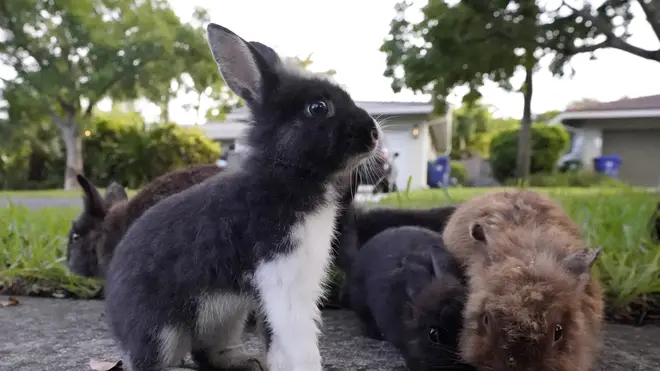
Shelagh Fogarty 1pm - 4pm
17 July 2023, 09:34

Residents of Jenada Isles in Wilton Manors are trying to get together the funds to have around 100 lionhead rabbits rescued and moved elsewhere.
A suburb in the US state of Florida is having to deal with a growing group of domestic rabbits on its streets after a breeder illegally let them loose.
Between 60 and 100 lionhead rabbits have taken up residence in the yards of the suburban Fort Lauderdale community of Jenada Isles in Wilton Manors.
The lionheads have a thick fur and fearless nature, making them unsuited for life outside among Florida’s heat and predators.
Residents are trying to raise 20,000 to 40,000 dollars (£15,270 to £30,550) needed to rescue the animals and get them into homes.

The city of Wilton Manors has agreed to give the residents of Jenada Isles more time after first saying the rabbits would have to be exterminated.
Resident Alice Griggs is spearheading efforts to raise the funds for a rescue group to capture, neuter, vaccinate, shelter and then give away the estimated 60 to 100 lionheads now populating the 81-home community in Wilton Manors.
They are descendants of a group a backyard breeder illegally let loose when she moved away two years ago.
“They really need to be rescued,” Ms Griggs said.
“So we’ve tried to get the city to do it, but they’re just dragging their feet.
“They think that if they do that, then they’ll have to get rid of iguanas and everything else that people don’t want around.”

Monica Mitchell, whose East Coast Rabbit Rescue would likely lead the effort, said capturing, treating and finding homes for the animals “is not an easy process”.
Few veterinarians treat rabbits, and many prospective owners shy away when they find out how much work the animals require.
Ms Griggs said of the rabbits: “People don’t realise they’re exotic pets and they’re complicated. They have a complicated digestive system and they have to eat a special diet.
“You can’t just throw any table scraps at them.”
Wilton Manors is giving Ms Griggs and other supporters time to raise money and relocate the rabbits rather than exterminate them, even though the city commission voted in April to do just that after receiving an 8,000 dollar (£6,110) estimate from a trapping company.
The vote came after some residents complained that the lionheads dig holes, chew outdoor wiring and leave droppings on pavements and driveways.
City commissioners also feared the rabbits could spread into neighbouring communities and cities and become a traffic hazard if they ventured onto major streets.

“The safety of this rabbit population is of utmost importance to the City, and any decision to involve ourselves will be certain to see these rabbits placed into the hands of people with a passion to provide the necessary care and love for these rabbits,” Police Chief Gary Blocker said.
The Florida Fish and Wildlife Conservation Commission, which often culls invasive animals, has told the city it will not intercede. The rabbits pose no immediate threat to wildlife.
The Wilton Manors colony survives and grows only because lionheads breed like the rabbits they are, with females birthing litters of two-to-six offspring every month, starting when they are about three months old.
On a recent morning in Jenada Isles, clutches of two to 10 bunnies dotted the streets and lawns, the bravest hopping up to residents and visitors in search of treats.

A large group of rabbits gathered on the driveway of Gator Carter, who puts out food for them. He said the lionheads bring the neighbourhood joy, and his two young grandchildren love giving them carrots.
“People drive by, stop, love ’em, feed ’em,” Mr Carter said. “They don’t bother me. We have a couple Airbnbs on the island here and the people (guests) are just amazed that the rabbits come right up to them.”
But fellow resident Jon King said he wants the rabbits gone soon. They dig in his yard and he spent 200 dollars (£152) repairing his outdoor lights after they damaged the wiring. He bought rabbit repellent, but that failed to work, and his little dog does not scare them: “He’s their best friend.
“Every morning, I get up and first thing I do is cover up the holes and chase them out of the backyard. I like them, I just wish they would go somewhere else,” Mr King said.
“Rescue would be great.”